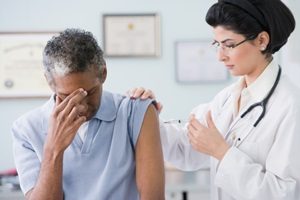 Colds and flu can leave you flat on your back, completely out of the game for a few days. But pneumonia is another beast altogether – and a frightening one at that. So it’s important to know the main causes of pneumonia, and the signs and symptoms of pneumonia. Especially the symptoms of pneumonia in the elderly.
Colds and flu can leave you flat on your back, completely out of the game for a few days. But pneumonia is another beast altogether – and a frightening one at that. So it’s important to know the main causes of pneumonia, and the signs and symptoms of pneumonia. Especially the symptoms of pneumonia in the elderly.
Pneumonia dangerous for seniors
It can be a very serious condition that can take hold in young, healthy people, but is a greater threat to seniors, babies and people with other diseases or impaired immune systems.
Advertisement
Their natural ability to fight back isn’t strong enough, and sometimes pneumonia can be fatal. Smokers, too, are at greater risk because smoking damages your body’s defenses against bacteria and viruses.
We’ve laid out the facts on the most common causes of pneumonia and the signs to look for. If you or a loved one catches the infection, you want to take action and know that you may need to see your doctor for a course of antibiotics.
What is pneumonia?
 Pneumonia is an infection of the lungs. The infection inflames the air sacs in one or both lungs. You’ve heard about fluid in the lungs and difficulty breathing? With pneumonia, the inflamed air sacs can fill with fluid or pus, causing all the coughing and phlegm – often chronic symptoms of pneumonia in adults.
Pneumonia is an infection of the lungs. The infection inflames the air sacs in one or both lungs. You’ve heard about fluid in the lungs and difficulty breathing? With pneumonia, the inflamed air sacs can fill with fluid or pus, causing all the coughing and phlegm – often chronic symptoms of pneumonia in adults.
How does this happen? A number of organisms, most commonly bacteria, viruses and fungi, get into our system, usually by the air we breathe. We all need to breathe! How you get pneumonia can be unavoidable, which makes a strong immune system so key, particularly for seniors and others at higher risk.
Causes of pneumonia
 Let’s look at the main causes of pneumonia. While your body prevents these germs from infecting your lungs, for the most part, sometimes these germs can overpower your immune system. It happens even if your health is good, so anyone and everyone is a target.
Let’s look at the main causes of pneumonia. While your body prevents these germs from infecting your lungs, for the most part, sometimes these germs can overpower your immune system. It happens even if your health is good, so anyone and everyone is a target.
As for the main causes of pneumonia, they’re categorized by the types of germs and where you got the infection. Community-acquired pneumonia, which is caught outside hospitals or health care centers, is the most common. The following, then, are the most common causes of pneumonia:
- Bacteria: In the United States, the most common cause of bacterial pneumonia is Streptococcus pneumoniae. It happens on its own, or takes hold after you’ve had a cold or flu when your defenses are down. This type may affect one part or lobe of the lung, which is a condition known as lobar pneumonia.
- Bacteria-like organisms: These organisms are called mycoplasma pneumoniae, which bring on milder symptoms. So if you have “walking pneumonia”, where you don’t feel so rough you have to stay in bed, these organisms are likely the culprit.
- Viruses: Some of those same pesky viruses that cause cold and flu can cause pneumonia. These are most common for children under five and symptoms usually are milder.
- Fungi: The fungi that can cause pneumonia are found in soil and bird droppings. They get in the air and we breathe them in as well! This pneumonia is more common in people with other diseases or compromised immune systems.
Further, there is hospital-acquired pneumonia and health care center-acquired pneumonia, both of which can be more serious because the bacteria responsible often are resistant to antibiotics. A more rare type is aspiration pneumonia, brought on when you inhale drink, food, vomit or saliva into your lungs because something has disrupted your gag reflex. Possible causes are a brain injury, swallowing problems or excessive use of drugs or alcohol. The big question here is, when is pneumonia contagious?
Symptoms of pneumonia
 Now that we’ve reviewed the most common causes of pneumonia, we can discuss the signs and symptoms of pneumonia. They range from mild to severe, depending on the type you have, your age and your overall health. Mild symptoms are similar to cold and flu, but they tend to last longer. You want to especially be aware of these symptoms of pneumonia in the elderly because this group is at higher risk.
Now that we’ve reviewed the most common causes of pneumonia, we can discuss the signs and symptoms of pneumonia. They range from mild to severe, depending on the type you have, your age and your overall health. Mild symptoms are similar to cold and flu, but they tend to last longer. You want to especially be aware of these symptoms of pneumonia in the elderly because this group is at higher risk.
Signs and symptoms of pneumonia include the following:
- Persistent cough (you may cough up greenish or yellow mucus, or even bloody mucus)
- Fever, which may be mild or high
- Sweating and shaking chills
- Chest pain
- Shortness of breath, which may only occur when you climb stairs
- Fatigue
- Nausea, vomiting or diarrhea.
Note, too, that seniors over 65 and people in poor health may also have a lower body temperature. Older people can also experience sudden changes in mental awareness.
If you have difficulty breathing, chest pain or persistent fever and cough, particularly if you’re coughing up pus, you need to see your doctor. Don’t wait! Pneumonia can be a life-threatening condition. Now that you have an understanding of the most common causes of pneumonia, and the signs and symptoms of pneumonia, you can be more prepared. Keep well!
Related Reading:
Sleep troubles put you at risk for pneumonia
Tired, so tired, of waking up and moving to the couch to get a decent night’s rest? Your partner’s snoring may not just be disturbing your sleep – it may be a sign of an underlying sleep condition known as sleep apnea. This could also put you at greater risk for pneumonia. Here’s why.
Advertisement
4 signs you’re not ready for flu season
Yes, I just had my flu shot this week. I’m primed to make it through the season of probable sickness without being sidelined to the couch with a box of Kleenex and easy access to the bathroom.
Sit me down right next to someone who is hacking away and feverish with sweat – with no escape route available – and I’ll be fine in the days to come…right? Not necessarily. Read more here.
